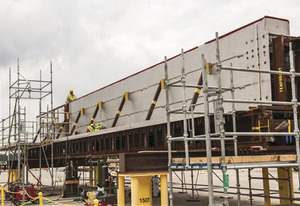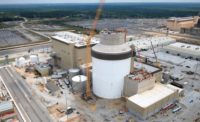The Nuclear Regulatory Commission is requiring contractor CB&I to enact measures to improve the workplace culture related to quality control at the firm's Lake Charles, La., plant that supplies wall modules to nuclear-power projects in Georgia and South Carolina.

On Sept. 17, the NRC announced a deal with the company that resolves two employment discrimination violations at Shaw Nuclear Services, later purchased by CB&I. One violation involved the firing of an employee who had raised concerns over reports of faulty rebar. While the agreement applies to all the contractor's nuclear facilities, it stems from an NRC-led investigation into practices at Shaw Modular Services (SMS), the former name of the Lake Charles site. Partnered with Westinghouse, CB&I is leading the construction of two nuclear expansion projects: the Plant Vogtle expansion in Waynesboro, Ga., and the V.C. Summer expansion for South Carolina Electric and Gas in Jenkinsville, S.C.
An NRC investigation revealed that, among other findings, 27% of Lake Charles workers feared retaliation for raising concerns over quality. In a letter sent to CB&I in April, the NRC stated it had determined that "a chilled work environment for raising and addressing safety concerns exists at SMS."
In response to the NRC earlier this year, CB&I President and CEO Philip Asherman stated, "Considerable work needs to be done to correct the culture at Lake Charles."
As part of the agreement, CB&I must update its work-environment policies; provide employee-protection training for supervisors and staff; ensure independent review of proposed adverse actions against employees; and perform safety-culture assessments of nuclear-related operations.
CB&I would not respond to questions but stated via email, "Since the acquisition of Shaw, CB&I has taken action and will continue to implement new steps to foster and promote a healthy nuclear safety culture, where all employees feel open to identify issues and express concerns."
The quality of product coming out of Lake Charles, which produces submodules for the CA20 auxiliary buildings planned for the Georgia and South Carolina projects, also has been a concern at the Vogtle site. Earlier this year, Vogtle's project monitor, William Jacobs, told Georgia state officials that Lake Charles "has not demonstrated the ability to fabricate high-quality CA20 submodules ... that meet the design requirements at a rate necessary to support the project schedule." According to Jacobs, an unspecified number of CA20 submodules were delivered to the Vogtle project with the wrong type of welds and had to be reworked on-site.
In September, Georgia Power told the PSC that it has singled out Lake Charles for "real-time oversight" of its fabrication activities, with release of CA20 submodules to the site occurring on a "case-by-case basis." The utility said it "will continue this practice until the Lake Charles facility has demonstrated its ability to fabricate modules in compliance with licensing and quality requirements."



Post a comment to this article
Report Abusive Comment